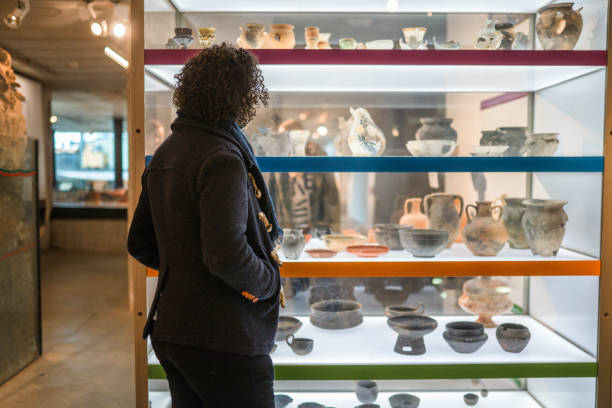Foundations That Support Museums: Essential Aid to Global Heritage.
The landscape of cultural preservation is defined by the synergistic bond between museums and their benefactors. Museums are the custodians of our shared cultural heritage, but it is the philanthropic contributions of foundations that enable these institutions to perform their vital role.
A robust financial support framework is paramount to ensuring the survival and growth of these epicenters of human knowledge and history.
With the increasing recognition of museums’ societal value, foundations are stepping up to foster access, promote education, and ensure the preservation of invaluable artifacts.
This article explores the foundations that support museums, serving as an essential aid to our global heritage.
The Vital Role of Foundations
Museums are the nexus where past, present, and future intertwine, fostering an environment that enables society to connect with its history and inspire future generations. The world of philanthropy plays a significant role in supporting these vital institutions through funding, development, and strategic partnerships.
The interplay between foundations and museums not only ensures the continuation of these institutions but also facilitates their evolution, helping them to adapt to the dynamic demands of modern society.
For instance, foundations play a pivotal role in promoting digital transformation in museums, enhancing accessibility, and facilitating outreach programs that engage diverse communities.
Key Foundations that Support Museums
Let’s now delve into some of the influential foundations globally that are integral to the sustenance and growth of museums.
1. The Andrew W. Mellon Foundation: This foundation’s focus on arts and humanities has led to substantial contributions to museums. The foundation has recently initiated the “Monuments Project,” a five-year, $250 million commitment to re-imagine and transform how our collective history is represented in the public realm.
2. The Ford Foundation: Known for its support for arts and culture, this foundation has often prioritized museum development, including providing support for diverse representation and accessibility in museums.
3. The Getty Foundation: The Getty Foundation has a long history of supporting museums, particularly those related to art. It is renowned for funding significant initiatives such as the “Pacific Standard Time” exhibitions that celebrate the art of Southern California.
4. The Knight Foundation: This foundation has supported museums’ digital transformation, encouraging technology integration to enhance visitor engagement and education.
5. The Kresge Foundation: With a focus on community development and education, the Kresge Foundation provides funding to museums with community outreach and education programs.
6. The MacArthur Foundation: Known for its ‘genius grants,’ this foundation also supports museums through its culture, equity, and the arts program.
7. The National Endowment for the Humanities (NEH): This U.S. government agency supports museums through various grants focused on the preservation of culture and improvement of humanities programming.
8. The National Endowment for the Arts (NEA): Like the NEH, the NEA provides valuable government support for museums, specifically those focusing on arts.
9. The Rockefeller Foundation: With a broad approach to global philanthropy, this foundation supports various museums, especially those engaged in science, history, and culture.
10. The Terra Foundation for American Art: This foundation specializes in promoting the understanding and appreciation of historical American art worldwide, supporting many art museums with this shared vision.
11. The Daniel and Florence Guggenheim Foundation: This foundation supports arts and education, including the development of exhibitions and education programs in museums.
12. The Henry Luce Foundation: Focused on the creation, dissemination, and understanding of knowledge, this foundation aids several museum initiatives, particularly in American art and Asia.
13. The Howard Hughes Medical Institute: This is a unique example of a foundation from the medical field supporting museums, particularly those focused on natural science and biology.
14. The Doris Duke Charitable Foundation: This foundation’s mission to improve the quality of people’s lives includes supporting museums, particularly in the realm of performing arts.
15. The Barr Foundation: The foundation provides significant funding to arts and creativity, including support to museums to foster a dynamic, vital arts ecosystem.
16. The Robert Rauschenberg Foundation: Committed to fostering the legacy of its namesake, this foundation supports artist-centric museums and programs that break down barriers to accessing culture.
17. The Walton Family Foundation: The foundation believes in access to world-class art for communities and supports museums in areas such as art, culture, and education.
18. The William Penn Foundation: With a dedication to improving public spaces, the foundation funds museums as they serve as significant cultural spaces in communities.
19. The Charles Stewart Mott Foundation: This foundation supports museums that focus on civil society, education, and the environment.
20. The Gordon and Betty Moore Foundation: The foundation funds science-based museums, emphasizing education and research initiatives.
Foundation Support: Impact and Practical Examples
One can appreciate the substantial contributions of these foundations by considering some practical examples.
The Getty Foundation, for example, recently contributed a $5 million grant to the Los Angeles County Museum of Art (LACMA) for the “Pacific Standard Time” initiative. This significant support enabled a series of exhibitions highlighting Latino and Latin American art, fostering cultural exchange and accessibility.
In another instance, the Andrew W. Mellon Foundation, through its Monuments Project, made a landmark grant to the Smithsonian Institution. This funding is aimed at revising and improving the representation of historical narratives in the National Museum of American History and the National Museum of African American History and Culture.
Conclusion
Museums are invaluable reservoirs of culture and history. These treasure troves are not self-sustaining and rely heavily on external support to carry out their important missions. As we have seen, foundations play a crucial role in enabling museums to meet their financial requirements, innovate their offerings, and engage with communities more effectively.
Philanthropic foundations, through their unyielding support for museums, play a crucial role in preserving global heritage, promoting cultural exchange, and ensuring that the education and inspiration derived from such institutions continue to benefit future generations.
Their indispensable contribution has etched an impact that transcends monetary value, weaving together threads of history, culture, art, and community in an enduring tapestry of shared human experience.
To the foundations listed above, and many more around the globe, museums owe their gratitude. Their support fosters the survival and evolution of these institutions, enabling them to stand as bastions of culture and history in an ever-changing world.





Things i have seen in terms of computer system memory is there are requirements such as SDRAM, DDR and the like, that must match the requirements of the mother board. If the pc’s motherboard is kind of current and there are no main system issues, modernizing the memory space literally normally takes under sixty minutes. It’s one of many easiest pc upgrade types of procedures one can imagine. Thanks for revealing your ideas.